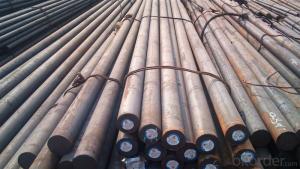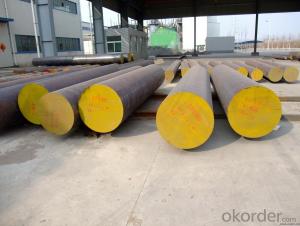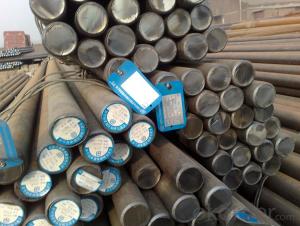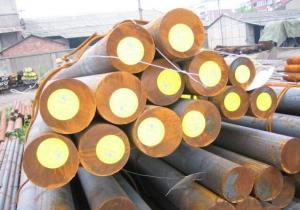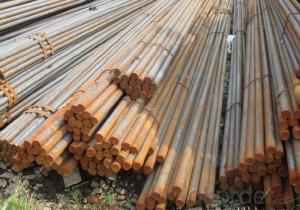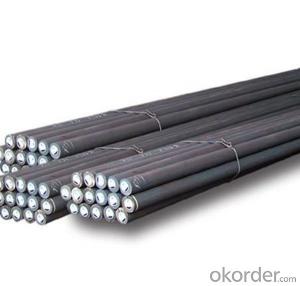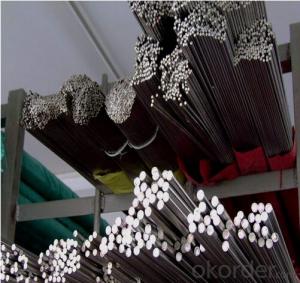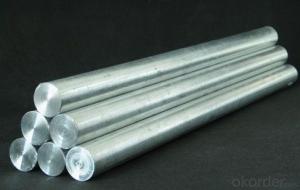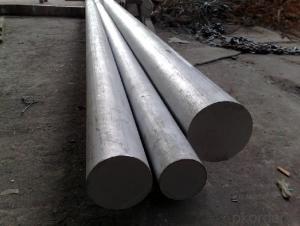9CrWMn Mould Steel Special Steel Carbon Steel
- Loading Port:
- China main port
- Payment Terms:
- TT OR LC
- Min Order Qty:
- 25 m.t.
- Supply Capability:
- 10000 m.t./month
OKorder Service Pledge
OKorder Financial Service
You Might Also Like
Specification
Chemical Composition(%)
Country | Standard | C | Si | Mn | Cr | W | S | P | Other |
China(GB) | 9CrWMn | 0.85-0.95 | ≤0.40 | 0.90-1.20 | 0.50-0.80 | 0.50-0.80 | ≤0.30 | ≤0.30 | |
USA(ASTM) | O1 | 0.85-0.95 | 0.20-0.40 | 1.00-1.30 | 0.40-0.60 | 0.40-0.60 | - | - | V:0.20 |
Germany(DIN) | 1.2510 | 0.90-1.05 | 0.15-0.35 | 1.00-1.20 | 0.50-0.70 | 0.50-0.70 | ≤0.35 | ≤0.35 | V:0.05-0.15 |
Japan(JIS) | SKS3 | 0.90-1.00 | ≤0.35 | 0.90-1.20 | 0.50-1.00 | 0.50-1.00 | ≤0.30 | ≤0.30 |
Available Size
Rolled flat steel :12-90mm × 205-610mm × L
Heat Treatment
Processing | Temperature ℃ | Hardness |
Anneal | 740-770 | ≤255HB |
Quenching | 790-840 | 62-65HRC |
Tempering | 180-250 | 58-62HRC |
Characterstics
1.High-carbon and low-alloyed oil quenching tool steel adopted widely in world
2.Higher hardening ability
3.Less deformation after heat treatment
4.High hardness and better abrasion resistance
Applications: Suitable for steel punching dies,shearing blades,measuring devices,thermosetting plastic moulds,etc


1, Your advantages?
professional products inquiry, products knowledge train (for agents), smooth goods delivery, excellent customer solution proposale
2, Test & Certificate?
SGS test is available, customer inspection before shipping is welcome, third party inspection is no problem
3, Payment Terms?
30% TT as deposit and 70% before delivery.
Irrevocable L/C at sight.
4, Trading Terms?
EXW, FOB, CIF, FFR, CNF
6, After-sale Service?
We provides the services and support you need for every step of our cooperation. We're the business partner you can trust.
For any problem, please kindly contact us at any your convenient time.
We'll reply you in our first priority within 24 hours.
- Q: What are the properties of precipitation-hardening steel?
- Precipitation-hardening steel, also known as PH steel, possesses several notable properties. One of its key features is its ability to be strengthened through a heat treatment process, known as precipitation hardening. This process involves heating the steel to a specific temperature and then rapidly cooling it, followed by aging at a lower temperature. This treatment causes the formation of fine particles within the steel, leading to increased strength and hardness. Another important property of precipitation-hardening steel is its excellent combination of strength and corrosion resistance. This steel alloy is often used in applications where both high strength and resistance to corrosion are required, such as in aerospace and marine industries. Additionally, precipitation-hardening steel offers good weldability, making it suitable for various fabrication processes. Furthermore, this type of steel is known for its versatility as it can be tailored to meet specific mechanical properties by adjusting the heat treatment parameters. This allows manufacturers to customize the steel's strength, toughness, and other characteristics according to the desired application. In summary, precipitation-hardening steel is characterized by its ability to be strengthened through a heat treatment process, its excellent combination of strength and corrosion resistance, and its versatility in achieving desired mechanical properties.
- Q: How does special steel perform in terms of electrical resistivity?
- Special steel typically has a relatively high electrical resistivity, which means it offers greater resistance to the flow of electric current compared to other materials. This property makes special steel useful in applications where low electrical conductivity is required, such as in electrical resistors or magnetic cores.
- Q: What is the role of special steel in sustainable manufacturing?
- Special steel plays a crucial role in sustainable manufacturing by offering numerous advantages that contribute to environmentally friendly production processes. Firstly, special steel is highly durable and has a long lifespan, which reduces the need for frequent replacement or repairs. This durability minimizes waste and extends the life cycle of products, reducing the overall environmental impact. Furthermore, special steel has excellent recyclability properties. It can be recycled multiple times without losing its quality or performance, making it a sustainable choice for manufacturers. By incorporating recycled special steel into the production process, manufacturers can reduce their reliance on virgin materials and decrease energy consumption and greenhouse gas emissions associated with the extraction and production of new steel. Moreover, special steel offers high strength and lightweight characteristics, enabling manufacturers to design products that are more energy-efficient. For example, in the automotive industry, using special steel in the manufacturing of vehicles reduces their weight, leading to improved fuel efficiency and lower emissions. This contributes to the reduction of carbon footprint and supports sustainable transportation. Special steel also plays a significant role in the production of renewable energy technologies. Wind turbines, solar panels, and hydropower systems require sturdy and resilient materials to withstand harsh conditions. Special steel provides the necessary strength, corrosion resistance, and durability required for these renewable energy infrastructure projects. By enabling the development of such technologies, special steel contributes to the growth of the renewable energy sector, which is essential for transitioning to a more sustainable energy mix. In conclusion, special steel plays a vital role in sustainable manufacturing by offering durability, recyclability, lightweight properties, and strength. By using special steel, manufacturers can reduce waste, energy consumption, and emissions, while also enabling the development of energy-efficient products and renewable energy technologies. Incorporating special steel into manufacturing processes is an essential step towards achieving a more sustainable and environmentally friendly future.
- Q: How does special steel perform in high-temperature applications?
- Special steel performs exceptionally well in high-temperature applications due to its unique properties. It exhibits excellent strength, hardness, and resistance to heat, oxidation, and corrosion at elevated temperatures. Special steel maintains its mechanical properties even in extreme conditions, allowing it to withstand high temperatures without deformation or failure. Its high thermal conductivity ensures efficient heat transfer, making it suitable for applications such as gas turbines, nuclear reactors, and aerospace components. Overall, special steel is a reliable and durable material choice for high-temperature environments.
- Q: What are the main characteristics of pressure vessel steel?
- Pressure vessel steel is a specific type of steel that is designed and manufactured to withstand high-pressure environments. It possesses several distinct characteristics that make it suitable for such applications. Firstly, pressure vessel steel has excellent strength and toughness properties. It is able to withstand the internal pressure exerted on it without deforming or rupturing, ensuring the safety and integrity of the vessel. This high strength is achieved through careful alloying and heat treatment processes that enhance its mechanical properties. Secondly, pressure vessel steel exhibits good weldability. This is crucial as pressure vessels often require various components to be joined together. The ability to weld the steel without compromising its structural integrity is essential for the fabrication and maintenance of pressure vessels. Additionally, pressure vessel steel is known for its high corrosion resistance. The steel is typically alloyed with elements such as chromium, molybdenum, and nickel, which provide a protective barrier against corrosive substances and environments. This is vital in preventing the degradation of the vessel and ensuring its long-term durability. Furthermore, pressure vessel steel is characterized by its ability to withstand a wide range of temperatures. It can maintain its strength and toughness even in extreme temperature conditions, making it suitable for applications where the vessel is subjected to high or low temperatures. Lastly, pressure vessel steel is subjected to rigorous testing and quality control measures to ensure its reliability and safety. It must meet specific standards and certifications, such as those established by organizations like the American Society of Mechanical Engineers (ASME), to be deemed suitable for pressure vessel applications. Overall, the main characteristics of pressure vessel steel include high strength and toughness, good weldability, corrosion resistance, temperature resistance, and adherence to strict quality standards. These properties make it an ideal material for the construction of pressure vessels, which are used in various industries such as oil and gas, chemical processing, and power generation.
- Q: How does special steel contribute to the automotive noise reduction?
- Special steel contributes to automotive noise reduction in several ways. Firstly, it is durable and strong, allowing for the construction of thinner and lighter components. This reduces the overall weight of the vehicle, resulting in reduced road and engine noise. Additionally, special steel has excellent vibration-damping properties, which helps absorb and minimize noise generated by the engine, suspension, and other moving parts. The use of special steel in the design of automotive structures and panels also helps reduce noise transmission from the outside environment into the cabin, providing a quieter and more comfortable driving experience for passengers.
- Q: Is special steel recyclable?
- Yes, special steel is recyclable.
- Q: Can special steel be used in the marine industry?
- Yes, special steel can be used in the marine industry. Special steel alloys, such as stainless steel or corrosion-resistant steel, are frequently used in the marine industry due to their high strength, durability, and resistance to corrosion from saltwater. These specific steel types are essential for various marine applications, including shipbuilding, offshore structures, and marine equipment, as they can withstand the harsh conditions and corrosive environment of seawater.
- Q: How does special steel contribute to improving product safety?
- Special steel contributes to improving product safety in several ways. Firstly, special steel is known for its exceptional strength and durability, which enhances the structural integrity of various products. This ensures that they can withstand heavy loads, extreme temperatures, and other challenging conditions without compromising safety. Secondly, special steel often possesses excellent corrosion resistance, reducing the risk of product failure due to rust or degradation over time. Additionally, certain types of special steel offer high impact resistance and resistance to wear and tear, making products more resistant to damage and increasing their lifespan. Ultimately, by incorporating special steel into the manufacturing process, products can be made safer, more reliable, and longer-lasting for the benefit of consumers.
- Q: What are the different surface protection methods for special steel?
- There are several surface protection methods for special steel, including galvanization, coating with protective paints or varnishes, electroplating, and applying corrosion-resistant alloys or metals. These methods help prevent rust, corrosion, and other forms of damage, ensuring the longevity and durability of the special steel.
Send your message to us
9CrWMn Mould Steel Special Steel Carbon Steel
- Loading Port:
- China main port
- Payment Terms:
- TT OR LC
- Min Order Qty:
- 25 m.t.
- Supply Capability:
- 10000 m.t./month
OKorder Service Pledge
OKorder Financial Service
Similar products
Hot products
Hot Searches
Related keywords
